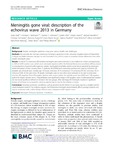Meningitis gone viral: description of the echovirus wave 2013 in Germany
Graf, Jonas
Hartmann, Christian J.
Lehmann, Helmar C.
Otto, Carolin
Adams, Ortwin
Karenfort, Michael
Schneider, Christian
Ruprecht, Klemens
Bosse, Hans Martin
Diedrich, Sabine
Böttcher, Sindy
Schnitzler, Alfons
Hartung, Hans-Peter
Aktas, Orhan
Albrecht, Philipp
Background
Aseptic meningitis epidemics may pose various health care challenges.
Methods
We describe the German enterovirus meningitis epidemics in the university hospital centers of Düsseldorf, Cologne and Berlin between January 1st and December 31st, 2013 in order to scrutinize clinical differences from other aseptic meningitis cases.
Results
A total of 72 enterovirus (EV-positive) meningitis cases were detected in our multicenter cohort, corresponding to 5.8% of all EV-positive cases which were voluntarily reported within the National Enterovirus surveillance (EVSurv, based on investigation of patients with suspected aseptic meningitis/encephalitis and/or acute flaccid paralysis) by physicians within this period of time. Among these 72 patients, 38 (52.8%) were enterovirus positive and typed as echovirus (18 pediatric and 20 adult cases, median age 18.5 years; echovirus 18 (1), echovirus 2 (1), echovirus 30 (31), echovirus 33 (1), echovirus 9 (4)). At the same time, 45 aseptic meningitis cases in our cohort were excluded to be due to enteroviral infection (EV-negative). Three EV-negative patients were tested positive for varicella zoster virus (VZV) and 1 EV-negative patient for herpes simplex virus 2. Hospitalization was significantly longer in EV-negative cases. Cerebrospinal fluid analysis did not reveal significant differences between the two groups. After discharge, EV-meningitis resulted in significant burden of sick leave in our pediatric cohort as parents had to care for the children at home.
Conclusions
Voluntary syndromic surveillance, such as provided by the EVSurv in our study may be a valuable tool for epidemiological research. Our analyses suggest that EV-positive meningitis predominantly affects younger patients and may be associated with a rather benign clinical course, compared to EV-negative cases.
Files in this item

